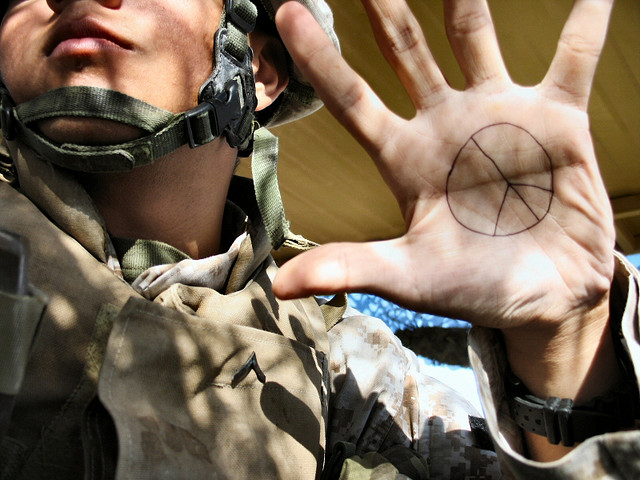We run our website the way we wished the whole internet worked: we provide high quality original content with no ads. We are funded solely by your direct support. Please consider supporting this project.

Where are the Blessed Peacemakers?
Religion Dispatches Magazine posted an article recently on embracing non-violence in the Christian tradition. In it, Elizabeth Drescher argues that the violent imagery in Paul’s writing accounts for a great deal of the violent posturing going on in churches today, but she also argues that these images have been misapplied and misunderstood. She challenges us that, “It is time…for Christian churches to atone for their own role in the culture of violence within which we all suffer by standing actively against it week upon week upon week in the pulpit and on the street.”
From the article:
The “armor of God,” too often turned to violent purposes, is comprised of truth, righteousness, and peace. Paul’s “helmet of salvation”—that which protects the center of human thought and reason—and “sword of the Spirit” are not of course acts of aggression, but words. Hence, likewise, the sword of justice wielded in the Revelation of John (Rev. 19:11-15)—the New Testament book most often cited in violent, apocalyptic Christian fantasies—extends from the mouth of the white-robed representation of the risen Christ. He slays the forces of cosmic evil not with physical aggression, but with the same “Word of God” that Paul calls out as the fundamental instrument of Christian faith, righteousness, and peace.
Christians, we seem to forget in all the clucking over the extent to which fried chicken sandwiches do or do not represent ideological preferences, are meant to use words, and to use them in particular for peace. This peace—the “Peace of Christ” in Christian tradition—is the heart of Christian teaching and practice, upon which rests everything from faithful stewardship of creation, to economic justice, to the rejection of violence as a solution for personal, familial, social, or political disagreements.
Image by Jayel Aheram. Sourced via Flickr.
Category: General
Tags: Non-Violence, Peacemaking
Related Reading

“I’m Angry, Too”
A reader (thanks, Jen!) sent us this blog post by Rachel Pieh Jones, an ex-pat from Minnesota living in Djibouti. She has some incredibly insightful and sad thoughts about the hateful responses to the recent protests and threats going on in other countries (and our own). We hope that as Christians we can contribute thoughtful…

Memorial Day
For Memorial Day, we thought we would repost Greg’s thoughts from 2007. In this post, Greg expresses his conflicted feelings over this holiday and gives a brief defense of Christian pacifism. *** Hope you all had a happy Memorial Day. (Isn’t that something of a misnomer — a happy time remembering people killed in war?) Memorial Day…

The Unfaithfulness of Violence
For more videos like this be sure to visit The Work of the People.

Responding to Driscoll’s “Is God a Pacifist?” Part I
I’m sure many of you have read Mark Driscoll’s recent blog titled “Is God a Pacifist?” in which he argues against Christian pacifism. I’ve decided to address this in a series of three posts, not because I think Driscoll’s arguments are particularly noteworthy, but because it provides me with an opportunity to make a case against what I’ve…

Podcast: If You Could’ve Killed Hitler, Wouldn’t You?
Greg challenges the intuitively appealing notion of killing Hitler and thereby preventing the massacre of millions of people. http://traffic.libsyn.com/askgregboyd/Episode_0326.mp3 —Edvard Munch, “The Murderer,” 1910

How Important is Non-Violence? (podcast)
Greg considers how God’s judgment differs from our own, making it an expression of his love. Whereas, for us, judgment stands contrary to our love. Episode 489 http://traffic.libsyn.com/askgregboyd/Episode_0489.mp3
